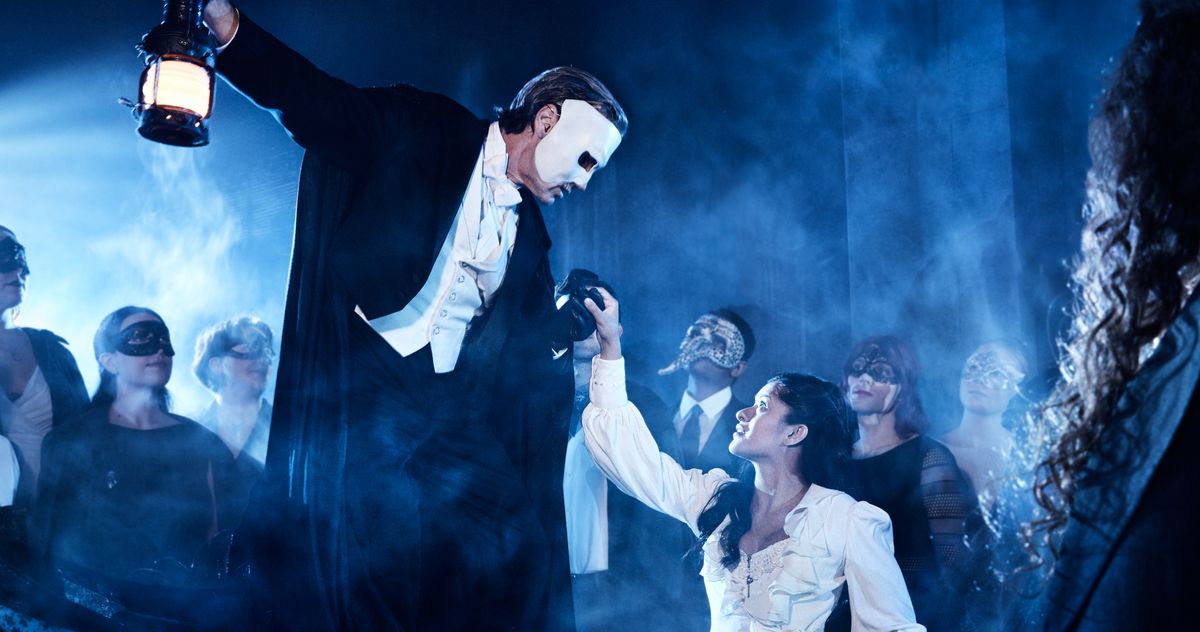From Punch, at the Samuel J. Friedman.
Photo: Matthew Murphy
If there’s currently a whole branch of British theater that owes its vibes to the designer Es Devlin, there’s another that’s firmly in its Steven Hoggett era. Hoggett is a choreographer who came to prominence in the aughts with supercharged shows like Beautiful Burnout (created with Frantic Assembly, the movement-based company he helped to found), the National Theatre of Scotland’s Black Watch, and The Curious Incident of the Dog in the Night-Time, for which he and his Frantic co-founder Scott Graham won a Tony. Harry Potter and the Cursed Child is one of his, as was the most recent Broadway Sweeney Todd, and while he didn’t choreograph James Graham’s new play Punch—which is making concurrent Broadway and West End premieres after its start at the Nottingham Playhouse—his DNA markers are all over it. Like Hoggett, movement director Leanne Pinder keeps the ensemble hyperkinetic, fast-walking in braided zig-zags until they all hit a unison lean, or taking on the outsize personas of Midlands hooligans, peacocking and jutting their chins, lunging back and forth as if they’re dribbling an invisible basketball.
There’s an athleticism and a cheekiness to the Hoggett school of stage movement — the street is always present, along with pinches of parkour, blended with elements of more traditional dance that would probably make a real posse of youths roll their eyes. Its diffusion through so much British drama over the last 20-odd years feels like a democratization: It’s not posh. The energy it brings and many of the stories it’s been harnessed to tell are assertively working-class. Likewise with Punch, which finds Graham in the place that means the most to him — his native county of Nottinghamshire. Along with his plays, Graham also created the BBC series Sherwood, which finished its second season last year and uses the dependable Brit mystery format to look at the larger issues of post-industrial suffering and government malfeasance that plague his hometown and so many others. Graham often grabs stories straight out of the news, and both Sherwood and Punch are based on real events (as were Tammy Faye and Ink, the prolific playwright’s last visits to Broadway). But while Sherwood was smart and strong-boned, entirely at home in its form and free enough with its fictionalization, Punch is more hemmed-in. Its true story is painful and personal enough that it makes for a play that can’t help feeling dutiful, like it’s going out of its way to be—in the sense of a child wanting to please a parent—good.
That kind of respectful earnestness was probably unavoidable, and so all the chest-out, dance-battle movement becomes a calculated counter: How do you add energy and lift to a tragic story, one in which the crucial action has to do with hard, quiet conversations and long-term internal shifts — and also one where you’re trying to do right by both the real living and their real dead? Director Adam Penford’s answer is to keep the play’s first act as pumped-up as he can, feeding in drips of the sadness to come as if by syringe, to get us acclimatized by the time things really need to get serious.
This time around, Graham has stuck as close to the facts of his true-to-life Nottingham tale as a writer can: His play is based on the 2022 book Right From Wrong by Jacob Dunne, who, in 2011, killed a stranger with a single punch. Dunne was 19 and throwing hands at random to back up his buddies in a bar fight. James Hodgkinson, the man he hit, was a bystander out for a night at the pub with his father. He spent nine days in a coma before his parents decided to take him off life support. That’s the awful low; but Dunne’s story is ultimately one of redemption. After serving just under half of a 30-month sentence for manslaughter, he reentered the world and ended up making contact with Hodgkinson’s parents. Through the compassionate yet rigorous structures of restorative justice and the generosity of two people who might have spent their lives hating him, Dunne changed course. Today he has a family, a degree in criminology, and a career with various justice and rehabilitation initiatives. David and Joan, James’s parents, are protective of him, and have also dedicated themselves to work with institutions like the Forgiveness Project. It’s quite a story, though not necessarily the kind that makes for the most astonishing theater.
That’s not to denigrate Punch, which is solidly built and well-meaning without sanctimony. Graham, Penford, and company have done just about all they can to build an engaging stage event, and if the play can’t avoid feeling a bit like an embodied pamphlet for restorative justice, then at least we’re all gathering to hear about something that this world inarguably needs. While the minor characters thrown on by the ensemble can sometimes land on the broad, educational-programming side of the street, there’s no drippy moralizing or excess sentiment (we may have Graham’s Britishness to thank for that). And as Jacob, the one who throws the punch, Will Harrison makes an emotionally compelling center. It’s a vulnerable, gutsy performance and a technically impressive one — I didn’t realize while watching him that he didn’t cross the Atlantic with the production.
Harrison’s Jacob starts out as an alpha lad, amped up and strutting through the Meadows, the Nottingham housing project where he lives with his mother (Lucy Taylor) and younger brother Sam (Cody Kostro). As he tells us his story—partly in the heat of the moment and partly through more humble, tentative sessions with a support group after his release—he’s at pains for us to understand that he wasn’t raised wrong. His mother doted on him and was distraught when he started to slip at school — and then outside of it, from hurrying past the kids who dealt drugs on his home turf to becoming one of them. (“The Meadows Housing Estate,” he tells us dryly, “is this like, big old social experiment… that basically fucking failed.”) Though Graham’s writing isn’t hot with fury, he’s plenty aware of the cracks in England’s foundations, left untended to in places like Nottingham where young men like Jacob fall right through. Like David and Joan (here played by Sam Robards and the moving Victoria Clark), we may not absolve Jacob, but we can all too easily come to appreciate the accumulation of institutional failures that helped land him in a pub, drunk and high and full of arbitrary anger, on the fateful night.
When Punch’s second act at last reaches the climactic series of encounters between Jacob, David, and Joan — mediated by Nicola (Camila Canó-Flaviá), a restorative-justice worker — the often bouncy, pulsing play ends up finding its greatest strength in stillness. James’s parents have written down questions they want to ask Jacob, and Joan clings to the crumpled piece of paper as if it were her lost son. Jacob, pale and stiff with shame and bewilderment, knocks over a glass of water and nearly weeps (“How can they even … like … fucking … I don’t know … ‘find it’ in themselv … to care,” he shudders). The tempo of Punch slows and the performances sharpen and deepen. Though the air is thick with anguish, three people start to grope their way through it toward each other. One can only imagine that these were the scenes that made Graham want to write the play. They are its finest and—in a moment where truth and reconciliation can feel like utopian fantasies—its most radically hopeful.
Punch is at the Samuel J. Friedman Theatre.








:max_bytes(150000):strip_icc()/will-harrison-lucy-taylor-punch-092925-1-e8ffe7f057b3481d998bb1329026d46b.jpg)



